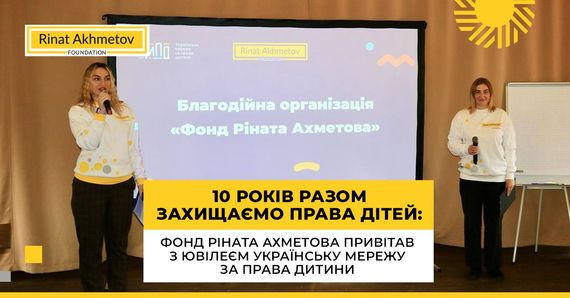How can foster parents cope with their emotions?

Marianna Lapina, a family psychologist and invited expert of the Rinat Akhmetov Foundation, told how to avoid conflicts between adults and children.
Host families often face various kinds of difficulties. They include not only the difficulties of their children, who have multiple psychological trauma behind them, disagreements at school, in a kindergarten or with their peers. But the adopting parents, fosterers or caretakers also solve a wide range of their own tasks every day. Therefore, such families need assistance and support of a psychologist or people who can understand them, for example, their like-minded persons raising orphans.
Different cities have mutual support groups for host families. I have been holding such meetings for many years. They provide a lot of resources for families, help solving current problems. Such meetings allow to talk about yourself without worrying that others will condemn or give unnecessary but "good" advice.
At one of these meetings, one adoptive mother shared her feelings about the fact that she sometimes "explodes" and can yell at the child. And as some may say, this topic got hold of all present foster parents. It turned out that many of them have similar situations, in which they cannot cope with their emotions and take it out on a child, not only at the foster one, but on their own child as well, after which they feel guilty. Parents shared that sometimes they do not understand what is happening to them at that moment. The child does not do anything that bad, but the adult loses his composure. And we decided to figure this out.
Women and men shared their stories on this topic. They also told that the dishes were badly washed, "no matter how much they say". They told how the child forgets to put things in their place, constantly leaving them lying around, and only for the hundredth time the child hears the mother’s request to do everything as requested. One of the participants shared that she was already tired of reminding her daughter that it was necessary to clean the room not only superficially, but also to clean under the beds, tables, and in the closet. Each of their clean ups ends equally badly, often with scandal and tears.
Foster parents said that sometimes it is necessary to repeat the most basic things many times, but the child does not seem to hear, and the story repeats again and again. The child does not perform the task as expected.
A vivid example is the story, in which a mother gave the task to a 13-year-old boy to prepare for the camp. He should have packed his things in a backpack and prepare food for the road with his mother. As the child put vegetables and fruits in a backpack, he managed to mash the plums, taking out the most good-looking ones from the bottom. And after his mother asked to be careful with the fruits and put them into another container, the boy turned everything upside down in the fridge and broke the container for vegetables.
At this point, adoptive mother could not stand it and began to shout at her son, not understanding how he managed to spoil everything. She heard in response: "You are so angry. It's just sometimes unbearable to be with you".
This made the woman think. After the emotions subsided, she realized that nothing terrible had happened in general, and indeed, it was not worth yelling at the child like that. The situation turned out unpleasant, and there was a feeling of guilt over her son for her incontinence.
We began to discuss this case, and it turned out that our participants of the meeting have many similar examples. They were all alike, just like twins, but someone had plums, someone had tomatoes, others had a "flood" because of an improperly closed washing machine.
The general discussion led this group of parents to several very important conclusions and clues in solving such problems. They are based on the experience, which the participants shared. And there were new foster parents at this meeting who bring up children from 1 to 2 years old, as well as "mature" enough host families that help orphans for more than 7-8 years.
The first conclusion was made by the participants due to the experience of "experienced" parents, which they shared at this meeting. The fact that for many children in the foster families, some order of things that is obvious for the members of a new family can be incomprehensible. These are the children who grew up in a boarding school, or who lived for many years in dysfunctional families in poor conditions, for example, without gas, heating, or where the floor replaced a bed. What is "understandable" by default to a domestic child cannot be as unambiguous for a social orphan with a difficult past. For example, if the child never used a washing machine, then it is necessary for this child to do the same things many times to not forget how to properly start it. And it is unlikely that these children have experience in sorting good and bad vegetables. This is taught to kids from two years old, and by the age of 13 it is completely clear for them, which cannot be said about the adopted child, just as in the story above. He coped with the task to sort out the fruits as he understood, without having positive experience.
Foster parents said that they often use simple things in order to avoid conflicts and help their son or daughter. For example, in order for the room to be "properly" cleaned just as mom or dad wants it, adults write to the child a sequence of actions of what should be cleaned and how. The child who was brought up in the family did it many times, at first with his mother or father, then independently, but poorly, and by the age of 10 they began to perform cleaning as "as it should be done." An adoptive child cannot master such a task in a short time, since, as the child enters a new environment, he/she receives a large number of completely new mini-tasks. And each of them has its own algorithm. In addition, many foster children emotionally and intellectually lag behind their "domestic" peers because their needs in the past were not met in due measure, and they suffered physical and moral violence. Therefore, it is sometimes necessary to explain some things to a 13-year-old child as if this child is 7 years old. Foster parents just need to understand this and be ready.
Sometimes it is enough for one child to simply tell the algorithm of actions, only a clearly written instruction will help other children, and as for the youngest ones who cannot read or those that have mental retardation will find help in pictures that will depict the sequence of actions. This method proved successful in a foster family, with which we have worked. Parents were in despair because they had to tell the children about the things they need to do every day. Every day is the same. The daily routine was not so complicated but was an unsolvable problem for beginners. They could not remember what to do, and every morning they woke up as if they were on another planet. It was difficult to prepare children for kindergarten and school and teach them how to take care of themselves. This is not surprising, since these children have lived almost all their little lives "at large" on their own. They were released from the house in the morning to beg and get food for themselves and their alcoholic parents, and in the evening, they ran home with a "catch".
Once in the family, the children were very resistant to the rules that are clear to all members of this family. In addition, these children forgot everything, because they had no need for it before. For example, to wash, brush teeth, put things on their place and so on.
The second conclusion of our meeting crystallized out of complaints about the constant cycle of the same activities. Parents shared a feeling that the constant domestic problems are very exhausting for them. And still, when there are many children and they have difficult behavior, parents constantly have to keep everything under control, and this takes a lot of energy. Therefore, there is the tension that can reach a certain limit and spill out in the form of irritation or outbursts of anger at a child or a spouse.
Everyone knows that a person whose needs are not satisfied, experiences such negative emotions as anger, irritation, anxiety and others. These emotions cannot be restrained for long. In the end, if there is no way out for them and no care of yourself, then sooner or later there will be emotional burnout. And this means that adoptive parents can become people who are not able to sympathize with their children and will not have the opportunity to give them warmth, care and love.
Therefore, it is very important for the parents to remember this, especially for those who have traumatized children in their families.
An adoptive mother, a participant of this meeting, drew attention to the fact that she is much less likely to shout at the relatives if she feels rested. For example, after meeting friends or doing sports. In her opinion, these are the moments when the problems of "improper" cleaning are not all that bad, and she can more easily explain to her children one more time how to sort out vegetables and fruits.
We also noted that it is very important for us all to gather together in such a group of like-minded persons. Meetings give an opportunity for adoptive parents to express all those negative emotions, that have been accumulated, in a safe environment. And there is a feeling that you will be understood and will be heard among people with similar problems.
The third conclusion, to which we came in the course of communication, was derived from the foregoing. It states that it is important for the parents to be able to cope with their emotions. Not to hide them in a piggy bank, which, just like a boiling pot, will sooner or later tear off the lid, but instead to find ways to express them constructively.
You can use a simple algorithm that helps switch the emotional part of the brain to a rational one. It reduces stress and helps cope better with strong emotions. For this, a person needs to realize that something is happening to him, since the tension usually accumulates gradually. Only after a while it will burst out in the form of anger, aggression or irritation.
After that, you should try to name this state, assign value to it. Answer the following questions: "What's wrong with me?", "What do I feel right now?". For example, say to yourself: "I'm angry right now". And the next stage is to assign this feeling to yourself, i.e. to admit that you are experiencing this anger right now. It's not someone else that made you angry, but you experience this emotion yourself.
Participants of our meeting said that doing so helps them, and they are trying to understand why such a feeling arises. It often turns out that there is an unmet need behind this emotion. For example, fatigue or the desire to be alone, which cannot be realized. And maybe it is the upcoming trip, because of which they experience anxiety, and it should be shared with someone in order to get consolation and support.
As soon as an awareness of what is happening to a person at a given moment comes to light, the causes of anger become clear and it decreases or goes away at all. And when this unconscious need is satisfied, then mom or dad ceases to be grumpy adults, but simply become parents. Exactly what their foster children want to see.
At this meeting, we also talked a lot about how important it is for the children, especially those who survived the chain of betrayals in their lives, to have reliable adults near them. But it is equally important for these boys and girls to see adults calm, self-confident and contented with their lives. Our children also learn this by looking at their new parents. They learn how to take care of themselves, how to manage emotions, express their needs.
Adoptive mother, who has a successful experience in raising children who have already grown up, successfully graduated from the school, decided on the way to life, shared that children are proud of her. They are proud that their adoptive mother and father are successful not only as parents, but also as individuals. They realize themselves and develop. Children like that adults, important for them, do not forget that they are not only parents, but also spouses, allowing themselves to sometimes be alone. And the adoptive mother takes care of her appearance, not forgetting about the others. Other participants agreed and gave similar examples from their lives.
At the end of the meeting they remembered the old parable that in one big family, when her mother was very tired, she locked herself in her room for a long time. The children began to knock at the door with alarm, but she did not open it to them. But when the troubled family members began to knock even louder, she looked out and said: "Do not bother me! I'm making a good mom for you".



